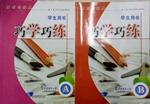题目内容
10. In spite of your unhappiness/Although you are unhappy, you shouldn't . (drown)
尽管你不开心,也不应该借酒浇愁啊。
10. drown your sorrows in drink

练习册系列答案
 巧学巧练系列答案
巧学巧练系列答案 课课练江苏系列答案
课课练江苏系列答案
相关题目
题目内容
10. In spite of your unhappiness/Although you are unhappy, you shouldn't . (drown)
尽管你不开心,也不应该借酒浇愁啊。
10. drown your sorrows in drink

 巧学巧练系列答案
巧学巧练系列答案 课课练江苏系列答案
课课练江苏系列答案